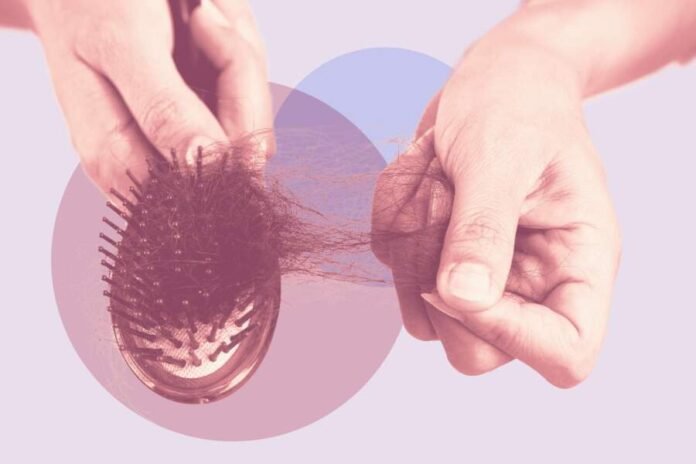Hair loss is a common problem that people of all genders and ages face.
Losing some hair daily is normal, but excessive hair shredding can indicate an underlying problem.
According to the American Academy of Dermatology, it is normal to shred 50-100 strands of hair every day.
While medications like Propecia and Finasteride are commonly prescribed to treat and manage the problem effectively, it is important to understand the cause.
This article explores the various factors contributing to hair loss and suggests potential treatment options.
Genetic Factors
Genetics is one of the primary causes of hair loss.
Androgenetic alopecia, commonly known as male or female pattern baldness, is inherited from either or both parents.
This problem can lead to hair thinning, receding hairline, and eventually baldness by affecting the hair follicles.
While genetic hair loss is more prevalent in men, women can also experience it, often with a different pattern of hair thinning.
Hair transplants, surgeries, etc, can help treat hair loss caused by genes.
Hormonal Imbalances
Hormonal imbalances can significantly impact hair growth and lead to hair loss.
According to a study published in the National Library of Medicine, hormones like Estrogen, Progesterone, and Androgens are closely related to hair follicles.
Dihydrotestosterone is a type of Androgen.
An excess of Dihydrotestosterone (DHT), a hormone derived from testosterone, can cause the hair follicles to shrink and produce thinner hair strands.
Factors such as Polycystic Ovary Syndrome (PCOS), thyroid problems, and hormonal changes during pregnancy and menopause can contribute to hormonal imbalances and subsequent hair loss.
Nutritional Deficiencies
Nutrition plays a vital role in maintaining healthy hair growth.
According to a study, Biotin, Riboflavin, Folate, and Vitamin B12 deficiency are linked to hair loss.
Inadequate intake of essential nutrients, such as iron, zinc, vitamins (particularly vitamin D and B-complex vitamins), and protein, can lead to hair loss.
These nutrients are crucial for the production of keratin, the protein that forms the structure of hair.
Poor dietary choices, restrictive diets, eating disorders, and certain medical conditions can cause nutritional deficiencies, impacting hair health.
Medical Conditions and Treatments
Several conditions and treatments for these conditions can trigger hair loss.
Autoimmune diseases like alopecia areata result in the immune system attacking hair follicles, leading to patchy hair loss.
Medicines like Propecia and Finasteride are popular medications that can treat Alopecia areata.
Scalp infections, such as ringworm, can cause temporary hair loss.
Additionally, chronic illnesses, such as diabetes, lupus, and cancer, as well as their treatments (radiation therapy and chemotherapy), can result in hair loss.
Physical and Emotional Stress
Excessive physical and emotional stress can disrupt the natural hair growth cycle, leading to hair loss.
Telogen effluvium is a common condition that can be triggered by illness, surgery, or a traumatic event.
These factors may cause many hair follicles to enter the resting phase simultaneously.
This can result in significant hair shedding a few months later.
Managing stress through relaxation techniques, therapy, and lifestyle changes can help mitigate hair loss.
Natural Aging Process
As individuals age, hair growth naturally slows down, and the hair follicles become less efficient at producing new hair.
According to a study published in 2018, the diameters of hair shafts start to decrease from the age of 25.
The rate of hair growth decreases, and the hair strands may become thinner and more prone to breakage.
This gradual hair thinning is known as involutional alopecia and is a normal part of the aging process.
Medications and Medical Treatments
Certain medications and medical treatments can cause hair loss as a side effect.
For example, medications used to treat cancer, arthritis, depression, heart problems, and high blood pressure may lead to temporary or permanent hair loss.
Additionally, hormonal contraceptives, including birth control pills, can cause hair thinning in some individuals.
Excessive Weight Loss
Significant and rapid weight loss, usually due to crash diets or eating disorders, can lead to hair loss.
When the body is deprived of essential nutrients and calories, it redirects its resources away from non-essential functions such as hair growth, resulting in hair shedding.
Gradual and healthy weight loss, on the other hand, is less likely to cause significant hair loss.
Environmental Factors
Environmental factors can contribute to hair loss.
Exposure to pollution, harsh weather conditions, and UV radiation can damage the hair shafts and weaken the follicles.
Chlorinated water, excessive sun exposure, and salt water can also adversely affect hair health.
Taking protective measures, such as wearing hats and using conditioning treatments, can help minimize damage.
Smoking
Smoking tobacco has been linked to hair loss.
The harmful chemicals in tobacco smoke can restrict blood flow to the hair follicles, impede the delivery of essential nutrients, and weaken the hair roots.
This can lead to hair thinning and increased hair loss.
Quitting smoking not only improves overall health but also promotes healthier hair growth.
Autoimmune Disorders
Certain autoimmune disorders like lupus and Hashimoto’s thyroiditis can cause hair loss.
These conditions trigger the immune system to attack healthy cells, including hair follicles.
This autoimmune response can result in hair thinning and bald patches.
Treating the underlying autoimmune condition can help manage hair loss in such cases.
Hairstyling and Hair Products
Certain hairstyling practices, such as tight ponytails, braids, and the use of hot styling tools, can contribute to hair loss.
These practices strain the hair shafts excessively, leading to hair breakage and traction alopecia.
Additionally, the use of harsh hair products containing sulfates, alcohol, and chemical dyes can weaken the hair, causing it to become brittle and prone to breakage.
Conclusion
Hair loss can be caused to various factors, including genetics, hormonal imbalances, nutritional deficiencies, medical conditions and treatments, stress, and hairstyling practices.
Identifying the cause of hair loss is essential for effective management and treatment.
If you are experiencing excessive hair loss, it is advisable to consult a medical professional or a dermatologist.
Read Also: Everything You Need to Know About Treating Male Hair Loss






























































